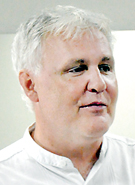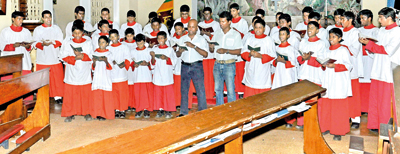Workshops create a community choir
Young Sri Lankan choristers from several different schools have managed to impress their mentors at the Colombo Music Festival – visiting lecturers Thomas Caplin and André de Quadros both told the Mirror Magazine that they were struck by the sincerity and dedication of the young performers they met. “Their strengths are immediately obvious – they have beautiful voices,” said Prof. De Quadros, commenting also on the work ethic and the dedication of his young protégés.
 Thomas Caplin |
 Prof André de Quadros |
Choirs from St Benedict’s, Methodist College, Ladies College, Trinity College, Hillwood, St. Peter’s and Holy Family Convent were among the schools which participated in the workshops. There to teach them were Prof. Caplin who has been attached to the Hedmark University College, Faculty of Education, Hamar and Prof De Quadros who is a Professor of Music at Boston University in the U.S.A.
Walking into his session, Prof Caplin said the first thing he wanted to do was get a fix on the choir’s potential, and how far they have to go before they could realise it. “The most important thing is to try to estimate how far a distance there is between what I perceive as the choir’s capacity – based on the singers available, the conductor’s musical and technical level and experience – and their actual performance, how they utilize their capacity,” he says, explaining that many things could hold choirs back. Sometimes, it’s something as simple as making sure they are placed so that every singer can hear himself or herself clearly or ensuring the conductor has a clear line of sight to each singer.
The content of the workshops varied according to the requirements of the group they were working with – incorporating subjects as diverse as vocal techniques, choral acoustics, methodology, pedagogy, choral didactics, choral conducting versus musical leadership and even choral psychology. The group had a little fun when they tried beat boxing, says Prof De Quadros, who introduced them to other ways in which to create percussion sounds with their bodies. “They loved it,” he says, adding that they also experimented with pieces the choirs had been working on as well as went over fundamentals like body posture and physical habits.
The challenges these young choristers face are the same as those of many other groups – primarily a lack of facilities for serious training and education. “There seems to be an overall feeling that they don’t have enough opportunities for study, development and for improving themselves and their work,” said Prof. De Quadros of the challenges facing local conductors. “With an ocean of luck and good will the conductors might be able to build up a strong singing movement, but it’s a lot faster to take control over this development and make it happen!” Prof Caplin said. “There is so much talent and there is nothing more valuable than investing in the future – and you do that by investing in the young of today.”
Both men have taught choirs all over the world and Sri Lanka seems to compare favourably. As a member of the board of the International Federation for Choral Music, Prof De Quadros said he was “astonished by the high level of participation…I think that what’s happening here is interesting and inspiring and exciting.”
Follow @timesonlinelk
comments powered by Disqus




















